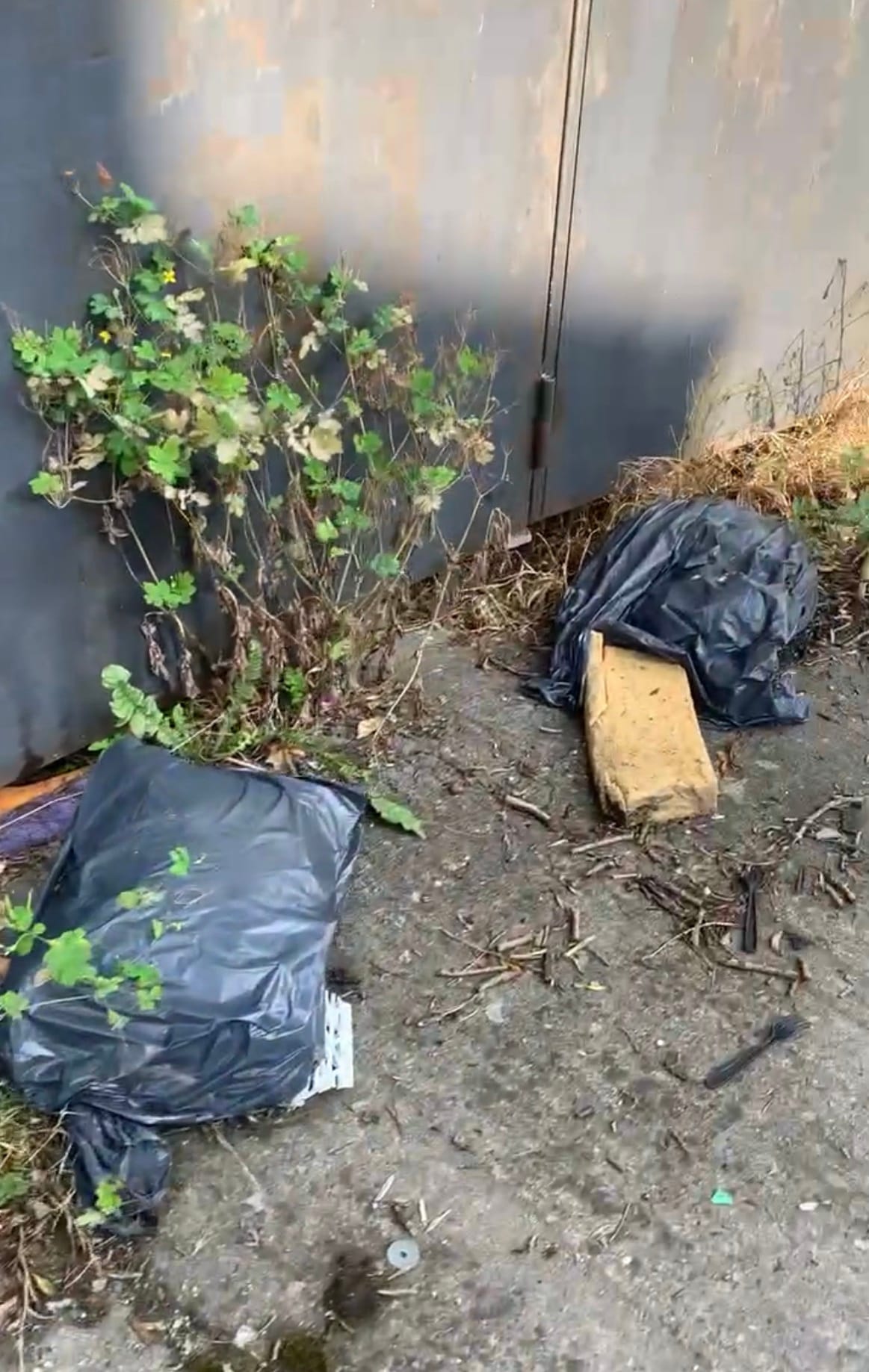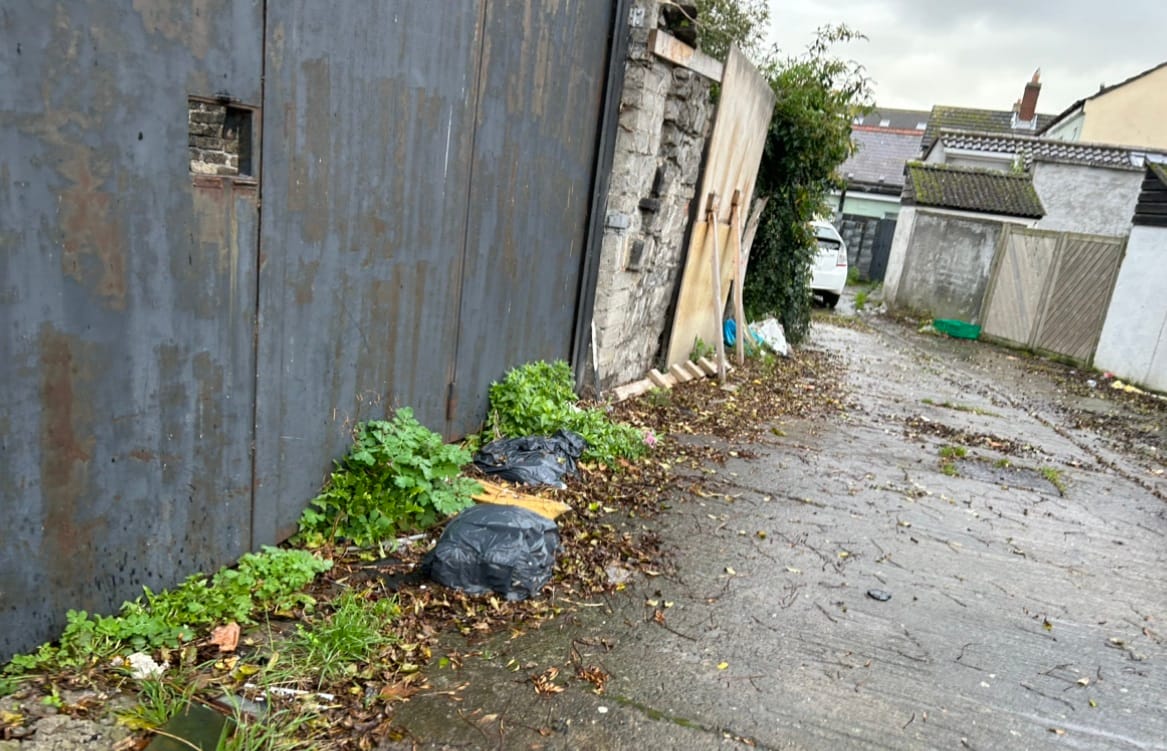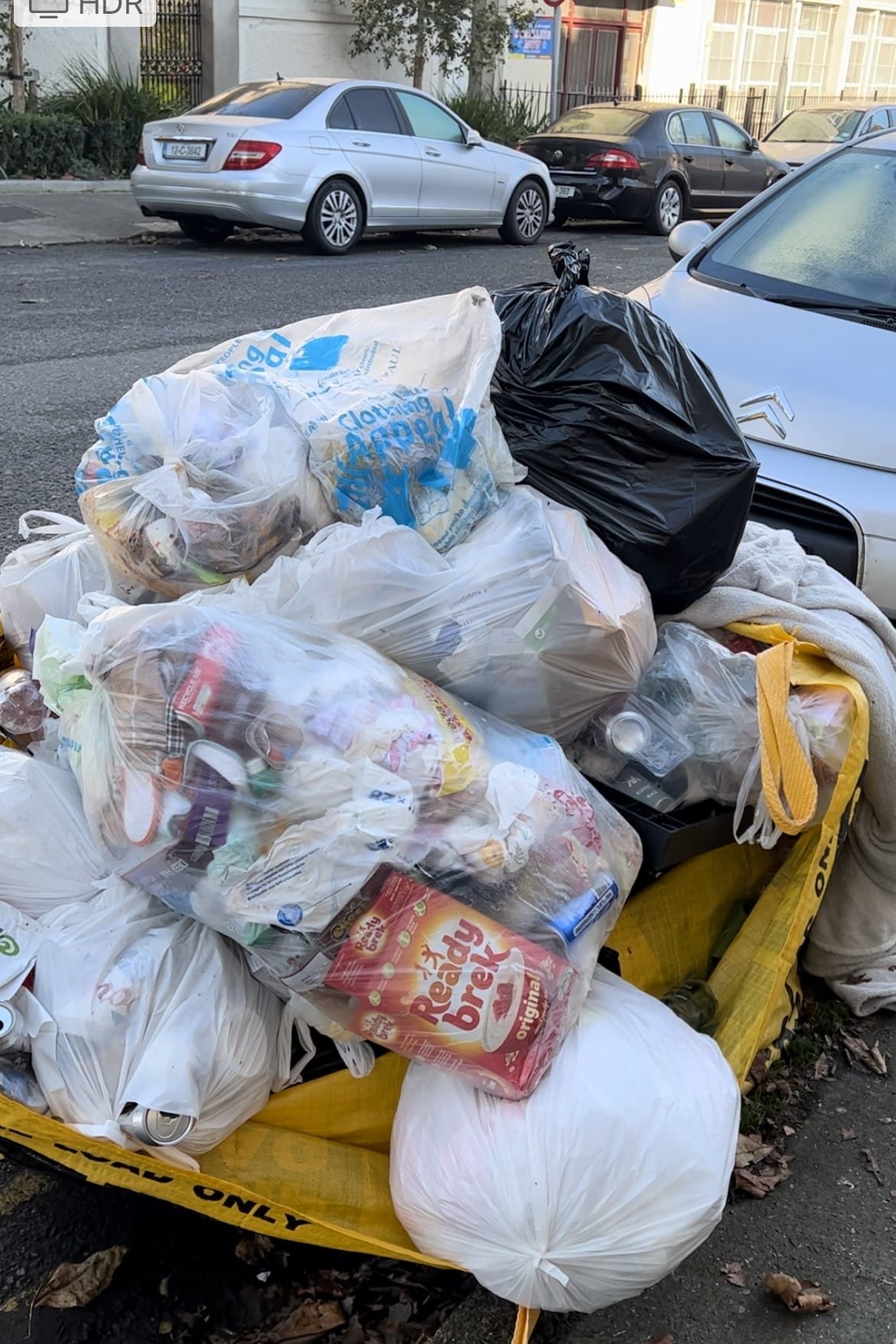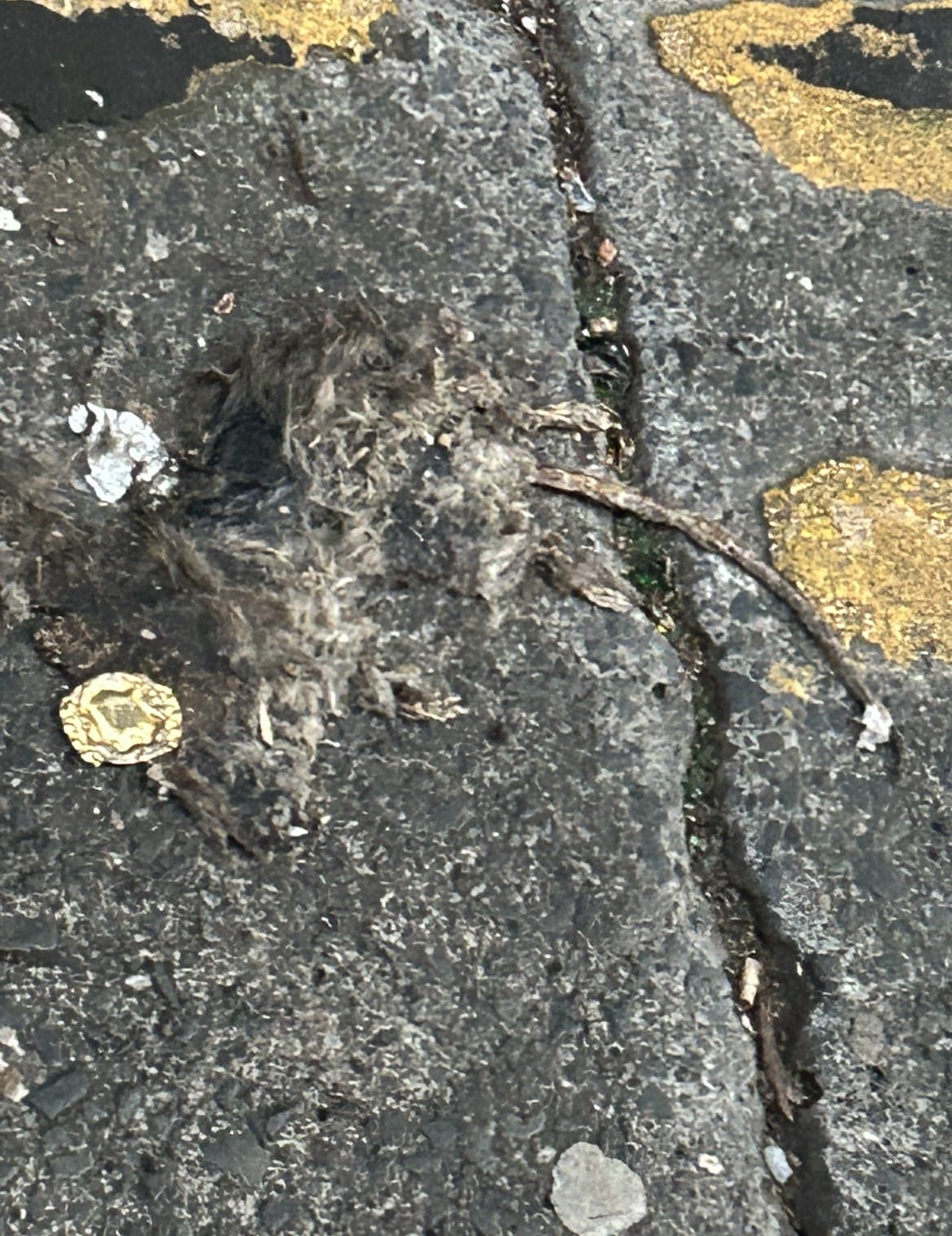What’s the best way to tell area residents about plans for a new asylum shelter nearby?
The government should tell communities directly about plans for new asylum shelters, some activists and politicians say.
Locals complain that it creates unsanitary conditions and attracts rats.

On 20 July on Campbell’s Row, a cul-de-sac at the end of Belvedere Avenue, two big black bags and a square of dirty foam lay on the ground by an old wall, show photos.
That same illegally dumped waste was there more than three months later on 26 October.
A day earlier, on 25 October, a Dublin City Council truck had rolled by Campbell’s Row to collect an illegally dumped mattress, a blue bag of waste with a council logo, and a supermarket trolley with a rotten dog house inside. Those had been sitting there for roughly a week.
But the two big black bags and the square foam, as well as broken eggshells, soft drink cans, a paper cup and a small grocery bag, were left behind when the council’s truck left.
Yet, Campbell’s Row is supposed to be swept by Dublin City Council staff weekly, according to the council’s schedule and map.


In September on Amiens Street too, a big black bag and piles of empty disposable cups sat on the footpath for three days. Yet, council workers are supposed to clean that street daily, according to the council cleaning schedule map on their website.
Residents in the north inner-city say that illegally dumped waste sits on main streets and side-streets for far too long before council workers come by to tidy it up, running down the neighbourhood and attracting rats.
A spokesperson for Dublin City Council said that “Waste Management Services will review and assess Campbell’s Row and take appropriate action”. An inspector will also look at Amiens Street, they said.
“Waste is removed as soon as possible using the resources available to us,” said the spokesperson.
“Dublin City Council Waste Management services continue to improve cleaning schedules and efficiencies across the city and NEIC [north-east inner-city] is a key focus for resources and future planning,” they said.
The council rubbish trucks have a schedule but can also pick up illegally dumped rubbish on sight, said a council spokesperson.
“The Public Domain team covers different routes on a daily basis but would be instructed to pick up any large items they see in the area and can be redirected throughout the day if we receive new reports of illegally dumped items,” they said.
Yet, on North Richmond Street, a side street off the North Circular Road, on 29 October, a large pile of illegally dumped bags and all types of waste was spread just a few metres from O’Connell Primary School.
The same illegal dumping had been sitting there and growing bigger since 22 October, as photos show.

The North Circular Road should be cleaned daily, according to the council’s website. North Richmond Street is supposed to be cleaned every day too, it says.
Other bags, dumped on the opposite side of the street to the primary school, under a “no dumping” sign, were collected several times during that week in late October, photos show.
Green Party Councillor Janet Horner said it’s often the case that the street-cleaning schedule doesn’t match reality on the ground.
“Certainly, a lot of information on the website will say street cleaning happens on a daily, weekly, frequent basis. In reality things are left much longer than that,” she said.
Said Fine Gael Councillor Ray McAdam: “The council cleaning schedule that is available on the website is not near accurate and is currently not fit for purpose.”
Dublin City Council does publish its schedule of how often it cleans streets, which are graded depending on how busy they are. But that has glitches.
Aline Batista, who has lived on Dorset Place for eight years, alerted the council on 7 September to the rats, pigeons and unsanitary conditions on Dorset Lane. It has been out of control for the last year, she says.
But Dorset Lane isn’t tagged with a cleaning schedule on the council’s online map, so residents can’t check when it is due to be swept.
A council spokesman said that a “Waste Management Inspector has verified Dorset Lane has a regular service via reports and routes.”
“There are currently a number of areas and lanes that are not showing on the online map which we are collating. On completion of city missing streets we will engage with the IS Department to resolve,” they said.
Yet, on 10 November, Batista wrote again to the council about the massive pile of illegal dumping festering there for weeks.
“This is disgusting there are rats here,” she wrote. “People just doesn’t respect the rules and leave bin in everywhere. can you help us please? Nobody is looking after this.”
Dublin City Council also has a portal for people to report litter and illegal dumping. But that doesn’t always work.
On 17 February, Edward Keogh made an online complaint to the council about a pile of waste on Campbell’s Row. It had been there for months, he said.
He got an email back from the council with a tracking number and a promise that it would be investigated. But he didn’t hear anything back for weeks.
Records released under the Freedom of Information Act on 4 April show that the case had been marked as complete and closed.
Keogh emailed the council again to ask why that was, as the illegal waste was still sitting there. A council worker said they would forward his question to the waste management department and gave him a link to make a complaint.
“At the moment the council just makes a token effort, they collect every now and then, sometimes leave the rubbish there for months,” says Keogh.
A spokesperson for the council responded to the issue of the case being marked as complete and closed by saying “This will be reviewed internally.”
Council workers eventually cleaned the illegally dumped waste on 5 May, according to a photo taken then, roughly two and a half months after it was first reported.
Adding to residents’ frustrations is how, even when the council does come by and clean, it can be superficial, says Patricia Costa, who has lived for four years on Dorset Lane.
The lane is plagued with pigeons and rats, say Costa and other residents. She points to the imprint of a desiccated dead rat on the pavement.

“I can’t even open the door of my house or let my son play on the street,” says Costa.
The “feedback” regarding the superficial cleaning in Dorset Lane “has been shared with local management and reviewed”, the spokesperson says.
Up to the end of September this year, council workers had picked up roughly 315 tonnes of illegally dumped waste in the north inner-city, according to a council report.
In the same period last year, they picked up 311 tonnes, shows another report.
“I think we do need to have faster collection but also think we need to have an improved collection service so we can figure out where dumping is coming from and [have] people being penalised,” said Horner, the Green Party councillor.
“The more we remove, the more likely dumping is to take place,” says McAdam, of Fine Gael.
Residents on Dorset Lane have asked for CCTV, they said.
McAdam, of Fine Gael, has consistently called for a name-and-shame approach, with images of those dumping posted up.
“We had this a number of years ago until the data protection commissioner decided that it was more important to protect the illegal dumpers than protect the community,” says McAdam.
A council spokesperson said cameras have been installed in Dorset Lane on numerous occasions but it was not possible to identify the dumpers on most of the footage. “There were some fines issued by those driving into the lane to dump.”
Independent Councillor Christy Burke said people illegally dumping know that CCTV is there anyway and can avoid it. “If they bring the hoods up and you try to bring them to the court, it’s thrown out of the court as not sufficient evidence.”
A council spokesperson said the council can’t use CCTV right now, anyway.
“We cannot use CCTV at present until the codes of practice for the Circular Economy Act are finalised,” they said. After that, the chief executive has to approve a CCTV scheme for the council, and only then can it be used, they said.
Said Horner, of the Green Party: “I think cameras play a role, and they are important but I think none of us in the long run would benefit from living in a surveillance society.”
“I think ultimately we need to get to the root of why people are dumping and solve these issues,” she said.
Councillors said they think some of the illegal dumping comes from overcrowded private rentals in the area.
Horner said that in some cases tenants should not be responsible for the bin contracts. “A lot of time you are looking at overcrowded and short-term tenancies , where it is very difficult for one person to take responsibilities for a bin contract.”
McAdam, the Fine Gael councillor, said he believes there’s a distinction to be made. “If you are renting a property, if it is a couple renting or a house share, I do not believe the landlord should be responsible for paying the bill, that should be the tenants’ responsibility.”
But if it is a building broken up into several apartments say, it is different, he said. “Then that should be the responsibility of the landlord.”
Would that be hard to track? Said McAdam: “That is why we need to be able to share information between local authority, revenue, the environmental health section that enforces the rental standards and Residential Tenancies Board.”
In the meantime, increasing the budget for street cleaning has been part of ongoing debates at the council.
During a recent budget consultative committee meeting, councillors talked about adding €5.2 million for street cleaning for next year, said Horner. “You could get a significant increase in the amount of cleaning done in the area.”
During the meeting to set the local property tax rate for the year too, she suggested setting a higher rate and then spending the money on street cleaning, she said.
The idea was to keep the local property tax at a base rate, rather than lowering it 15 percent as councillors have done each year, she said.
“In order to provide an additional €14.5 million for the city so we wanted to put an additional €12 million for the cleaning of public streets,” said Horner.
That was voted down, she says. “So instead now, we are trying to do it during the general budget discussions, we are trying to increase money assigned to it because it has been a perpetual issue.”
Burke, the independent councillor, said using extra local property tax revenue could have meant more staff employed to keep the city clean.
“At the end of the day, that is a government responsibility, providing funding anyhow. It would be nice, but again, you probably could have the staff working 24/7 and the illegal dumping will continue,” he said.
On Monday 13 November, Batista again emailed the council about the rubbish growing on Dorset Lane that she’d contacted them about on 7 September and 10 November.
“Please find attached the photo ai just took today around 4pm,” she wrote. “Its getting even worse.”
On Tuesday, while she was at work, they finally collected the waste, she says.
Get our latest headlines in one of them, and recommendations for things to do in Dublin in the other.